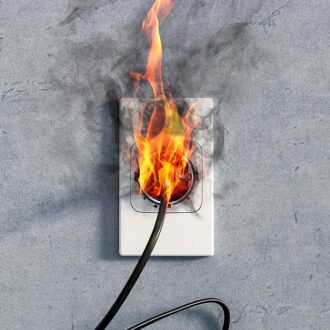Commercial Electrician
While the job descriptions seem similar, there are a few key differences between commercial, industrial, and residential electricians. Residential electricians provide electrical services and repairs in homes. Meanwhile, commercial electricians work primarily in stores, public buildings, and offices. Industrial electricians, on the other hand, provide electrical services in manufacturing and processing plants. Each type of electrical work has its own specialized skill set and requires separate training.
Commercial vs Residential Electrician
Both commercial and residential electricians complete wiring on new construction, installation, general electrical services, and emergency electric repairs. However, commercial electricians focus on electric requirements and code specific to commercial buildings. Meanwhile, residential electricians have detailed knowledge of the electric code requirements for home owners, buyers and sellers.
Commercial Electricians
Training
Commercial electricians complete an apprenticeship, acquire 8-10,000 hours of experience, and pass an exam to become a licensed commercial electrician. Additional requirements differ between states.
Worksites
Commercial electricians work for businesses and organizations in retail buildings, shopping centers, public buildings, offices, and more. We also install electrical wiring for commercial new construction.
Commercial Electrician Job Responsibilities
- Installation of commercial electrical wiring, recessed lighting, and electrical components
- Electrical panel maintenance and repairs
- Lighting retrofits for more energy efficient lighting
- Emergency electrical services
- General electrical services
Residential Electricians
Training
Residetial electricians complete an apprenticeship, acquire 8-10,000 hours of experience, and pass an exam to become a licensed industrial electrician. Additional requirements differ between states.
Worksites
Residential electricians work inside homes to complete repairs and new electrical projects such as wiring for a new fan installation. As residential electricians, it’s important to have great communication and listening skills to ensure we understand what the client wants and can deliver. We put the client at ease with good customer service and professionalism.
Residential Electrician Job Responsibilities
Residential electricians are experts in:
- Electrical repairs
- Residential wiring
- Electrical panel replacement
- Showcase lighting installation
- Recessed lighting installation
- Ceiling fan installation
- General electrical services
- Emergency electrical services
What Is an Industrial Electrician?
Training
Industrial electricians complete an apprenticeship, acquire 8-10,000 hours of experience, and pass an exam to become a licensed industrial electrician. Additional requirements differ between states.
Worksites
Industrial electricians most often work in settings in which machinery is used for manufacturing or processing. The electrical maintenance in these facilities require specialized skills to ensure production is safe and efficient. Furthermore, electrical equipment used in manufacturing is highly sensitive and expensive. Knowledge of the wiring requirements for manufacturing facilities and expertise working on manufacturing machinery sets industrial electricians apart from other types of electricians.
Industrial Electrician Jobs
Industrial electricians perform the following jobs in industrial settings:
- Industrial wiring specific to the industry
- Testing and repairs of electrical machinery used in production
- Grounding of machinery
- Electrical maintenance of machinery
Commercial electricians provide electrical wiring installation, electrical maintenance, repairs, emergency services, and electrical upgrades to commercial properties. Some of the most common settings a commercial electrician works in include retail centers, office buildings, government buildings, schools, and hospitals.
An industrial electrician works in a factory or manufacturing setting on the power supply and electrical components of manufacturing equipment. Meanwhile, a commercial electrician provides electrical installation, maintenance and repair for commercial buildings such as offices and retail centers.
Residential and commercial electricians usually earn comparable salaries and benefits based on skill, experience, and years in the profession.
It takes four years of apprenticeship and on the job experience to become an industrial electrician. It may take you a little longer than four years to complete the on the job hours requirement in your state, which is generally between 8,000 and 10,000 hours. Most apprenticeship programs include 2,000 hours per year of on the job experience.
Commercial Licensed Electrician
Palmer Electric has been continuously operating since 1951 for a reason. Our reputation for excellence and professionalism comes from getting every job done right. If you are looking for an expert commercial electrician or residential electrician team in the Orlando area, contact us today at (407) 646-8700.





